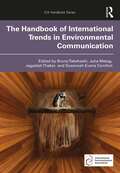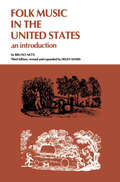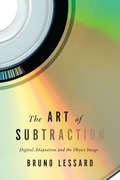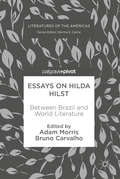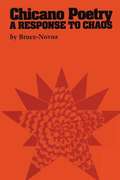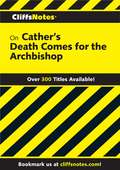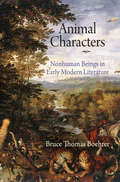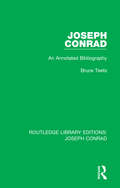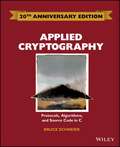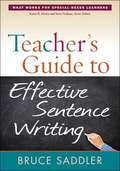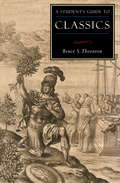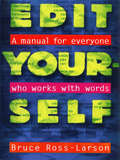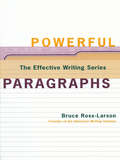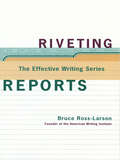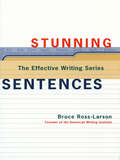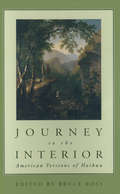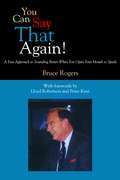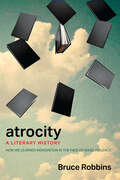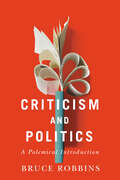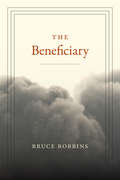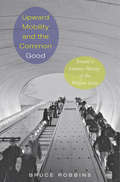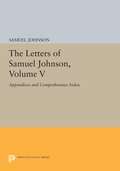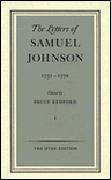- Table View
- List View
The Handbook of International Trends in Environmental Communication (ICA Handbook Series)
by Bruno TakahashiThis handbook provides a comprehensive review of communication around rising global environmental challenges and public action to manage them now and into the future. Bringing together theoretical, methodological, and practical chapters, this book presents a unique opportunity for environmental communication scholars to critically reflect on the past, examine present trends, and start envisioning exciting new methodologies, theories, and areas of research. Chapters feature authors from a wide range of countries to critically review the genesis and evolution of environmental communication research and thus analyze current issues in the field from a truly international perspective, incorporating diverse epistemological perspectives, exciting new methodologies, and interdisciplinary theoretical frameworks. The handbook seeks to challenge existing dominant perspectives of environmental communication from and about populations in the Global South and disenfranchised populations in the Global North.The Handbook of International Trends in Environmental Communication is ideal for scholars and advanced students of communication, sustainability, strategic communication, media, environmental studies, and politics.
Folk Music in the United States: An Introduction
by Bruno NettlFolk Music in the United States gives readers a broad overview of many kinds of folk music found in this country, from the songs of rural Appalachia an d New England through the indigenous music of the American Indians and the African music brought by slaves, to the folk songs of European minorities. It traces the way folk music lives in the modern city, in the academic world, and in the contemporary music of American composers.The book introduces readers to the study of folk music as a kind of music and as an aspect of human culture. It uses music as an index to understanding American culture while it introduces readers to various concepts in the field of ethnomusicology.
The Art of Subtraction: Digital Adaptation and the Object Image
by Bruno LessardThe Art of Subtraction is the first full-length study on the CD-ROM as a creative platform. Bruno Lessard traces the rise and relatively rapid fall of the CD-ROM in the 1980s and 1990s and its impact as a creative platform for media artists such as Jean-Louis Boissier, Zoe Beloff, Adriene Jenik, and Chris Marker. Although the CD-ROM was not a lasting commercial success it was a vibrant medium that allowed for experimentation in adapting literary works. Building on the work of Gilles Deleuze and Michele Foucault, Lessard establishes a comparative framework for linking digital adaptations with innovative concepts such as 'subtractive adaptation' and the 'object image' that will be of interest to researchers examining literary adaptations on other digital platforms such as websites, smart phones, tablets, and digital games. The Art of Subtraction is a fascinating study of intermediality in the late twentieth century and it provides the first chapter in the yet unwritten history of digital adaptation.
Essays on Hilda Hilst: Between Brazil And World Literature (Literatures of the Americas)
by Adam Morris Bruno CarvalhoThis book is the first collection of critical essays on Hilda Hilst (1930-2004) published in English. It brings together a variety of perspectives on one of Latin America’s most inventive and innovative authors. Nine essays by scholars and translators reflect about various aspects of her work, placing it in the context of Brazil and world literature. During her lifetime, Hilst won several major national literary awards and attracted legions of devoted readers. Her writing spanned styles and genres, encompassing poetry, theatre, and experimental fiction. She was also considered to be “a writer’s writer,” and her literary achievements eluded both mainstream acclaim and international recognition. In recent years, Hilst’s books have enjoyed increased visibility in Brazil and beyond. A host of translators (including three contributors to this volume) have finally made some of her masterpieces available in English. This pioneering collection of essays should excite longtime readers and introduce her to a new audience.
Chicano Poetry: A Response to Chaos
by Bruce-NovoaAlurista. Gary Soto. Bernice Zamora. José Montoya. These names, luminous to some, remain unknown to those who have not yet discovered the rich variety of late twentieth century Chicano poetry. With the flowering of the Chicano Movement in the mid-1960s came not only increased political awareness for many Mexican Americans but also a body of fine creative writing. Now the major voices of Chicano literature have begun to reach the wider audience they deserve. Bruce-Novoa's Chicano Poetry: A Response to Chaos-the first booklength critical study of Chicano poetry-examines the most significant works of a body of literature that has grown dramatically in size and importance in less than two decades. Here are insightful new readings of the major writings of Abelardo Delgado, Sergio Elizondo, Rodolfo Gonzales, Miguel Méndez, J. L. Navarro, Raúl Salinas, Ricardo Sánchez, and Tino Villanueva, as well as Alurista, Soto, Zamora, and Montoya. Close textual analyses of such important works as I Am Joaquín, Restless Serpents, and Floricanto en Aztlán enrich and deepen our understanding of their imagery, themes, structure, and meaning. Bruce-Novoa argues that Chicano poetry responds to the threat of loss, whether of hero, barrio, family, or tradition. Thus José Montoya elegizes a dead Pachuco in "El Louie," and Raúl Salinas laments the disappearance of a barrio in "A Trip through the Mind Jail. " But this elegy at the heart of Chicano poetry is both lament and celebration, for it expresses the group's continuing vitality and strength. Common to twentieth-century poetry is the preoccupation with time, death, and alienation, and the work of Chicano poets-sometimes seen as outside the traditions of world literature-shares these concerns. Bruce-Novoa brilliantly defines both the unique and the universal in Chicano poetry.
Homophones Visualized
by Bruce WordenA witty illustrated guide to words that sound alike, but are spelled differently and have completely different meanings. Do ewe no what homophones are? They&’re words that sound alike but are spelled differently and have completely different meanings—it&’s knot always easy to get it right. Based on his blog Homophones, Weakly, Bruce Worden&’s Homophones Visualized uses simple but clever graphics to help illustrate the differences between 100 pairs (or triplets or quadruplets) of words that sound alike. From beat and beet to flee and flea, baron and barren to golf and gulf, each spread contains a pair or group of homophones and corresponding illustrations that provide context for each word. Word lovers, educators, and kids all will delight in this witty and useful homophone guide to understanding which word is witch. Praise for Homophones Visualized &“My daughters and I read through the entire book together in one sitting, enjoying the clever wordplay. I particularly liked it when Worden was able to make similar-looking illustrations for a pair of homophones, with just subtle changes to reflect the differences in meanings. Whether you enjoy wordplay and puns, or if you just have a hard time remembering the difference between &“affect&” and &“effect,&” this book is for you!&” —GeekDad
CliffsNotes on Cather's Death Comes for the Archbishop
by Bruce WalkerThis CliffsNotes guide includes everything you've come to expect from the trusted experts at CliffsNotes, including analysis of the most widely read literary works.
Animal Characters
by Bruce Thomas BoehrerDuring the Renaissance, horses--long considered the privileged, even sentient companions of knights-errant--gradually lost their special place on the field of battle and, with it, their distinctive status in the world of chivalric heroism. Parrots, once the miraculous, articulate companions of popes and emperors, declined into figures of mindless mimicry. Cats, which were tortured by Catholics in the Middle Ages, were tortured in the Reformation as part of the Protestant attack on Catholicism. And sheep, the model for Agnus Dei imagery, underwent transformations at once legal, material, and spiritual as a result of their changing role in Europe's growing manufacturing and trade economies. While in the Middle Ages these nonhumans were endowed with privileged social associations, personal agency, even the ability to reason and speak, in the early modern period they lost these qualities at the very same time that a new emphasis on, and understanding of, human character was developing in European literature.In Animal Characters Bruce Thomas Boehrer follows five species--the horse, the parrot, the cat, the turkey, and the sheep--through their appearances in an eclectic mix of texts, from romances and poetry to cookbooks and natural histories. He shows how dramatic changes in animal character types between 1400 and 1700 relate to the emerging economy and culture of the European Renaissance. In early modern European culture, animals not only served humans as sources of labor, companionship, clothing, and food; these nonhuman creatures helped to form an understanding of personhood. Incorporating readings of Shakespeare's plays, Milton's Paradise Lost, Margaret Cavendish's Blazing World, and other works, Boehrer's series of animal character studies illuminates a fascinating period of change in interspecies relationships.
Output-Driven Phonology
by Bruce TesarThis book presents the theory of output-driven maps and provides a fresh perspective on the extent to which phonologies can be characterized in terms of restrictions on outputs. Closely related to traditional conceptions of process opacity, but differing in notable ways, the theory of output-driven maps applies equally to SPE-style ordered rules, Optimality Theory, and other phonological theories. It permits a formally rigorous analysis of the issues in Optimality Theory that is not possible with traditional process opacity. Also presented is a theory of phonological learning. Building on prior work on learning in Optimality Theory, the learning theory exploits the formal structure of output-driven maps to achieve learning that is far more computationally efficient than comparable prior approaches. In this book Bruce Tesar, one of the founders of the study of learnability in Optimality Theory, presents fresh perspectives in an accessible way for graduate students and academic researchers.
Joseph Conrad: An Annotated Bibliography (Routledge Library Editions: Joseph Conrad)
by Bruce TeetsOriginally published in 1990, this is a comprehensive and annotated bibliography of the writings on Joseph Conrad and his works. Covering the years from 1895 to 1975 it also includes indexes of authors, secondary works, periodicals and newspapers, foreign languages and primary titles. Part of a series of annotated bibliographies on English Literature in Transition, 1880-1920 this will be a valuable resource for students of literature.
Teacher's Guide to Effective Sentence Writing
by Bruce SaddlerThis practical book provides explicit instructions for teaching sentence-level skills to students who have difficulties in this area. The author explains the key role of sentence combining in the writing process and presents effective techniques for instruction and assessment. Numerous sample lessons, practice activities, planning tips, and grammatical pointers make it easy for teachers to incorporate sentence combining and construction into the writing curriculum at all grade levels (2-12). Accessible and engaging, the book helps teachers and students experiment with different ways to arrange thoughts and produce meaningful written work.
A Student's Guide to Classics (ISI Guides to the Major Disciplines)
by Bruce S. ThorntonBruce Thornton's crisp and informative Student's Guide to Classics provides readers with an overview of each of the major poets, dramatists, philosophers, and historians of ancient Greece and Rome. Including short bios of major figures and a list of suggested readings, Thornton's guide is unparalleled as a brief introduction to the literature of the classical world.
Edit Yourself: A Manual for Everyone Who Words with Words
by Bruce Ross-Larson"A strong new entry for the reference shelf of anyone who writes to be understood--or would like to."--Pittsburgh Press In the first part of this useful book, the author shows how to solve common problems of writing. The reader will learn how to recognize common problems of writing. The reader will learn how to recognize words and phrases that should be cut; how to shorten cumbersome sentences; how to arrange the elements of pairs, series, and compound subjects and predicates; how to recognize and rectify mismanaged participles; and how to be on the lookout for the better word. The second part of the book consists of more than 1500 recommendations for cuts, changes, and comparisons that editors make to produce writing that is concise and effective.
Powerful Paragraphs (The Effective Writing Series)
by Bruce Ross-LarsonWhether you are composing a Web page on the Internet or agonizing over an annual budget report, these books are the key to clarity, accuracy, and economy in any writing task. Explores the essentials of solid, point-based paragraphs, with chapters on unifying each paragraph around one point, developing paragraphs in a variety of interesting ways, binding sentences within the paragraph, and creating smooth transitions. A catalog of exemplary paragraph patterns, supported with clear diagrams, gives readers models to follow and options to consider.
Riveting Reports (The Effective Writing Series)
by Bruce Ross-LarsonWhether you are composing a Web page on the Internet or agonizing over an annual budget report, these books are the key to clarity, accuracy, and economy in any writing task. Covers everything from the first spark of inspiration to the final draft. Writers will see how a series of careful questions will lead them to the messages of their reports, and will learn how to let those messages drive the structure of the piece. From this foundation they will be able to create a paragraph-by-paragraph plan of their entire report. A final chapter explains the author's techniques for editing reports of any length.
Stunning Sentences (The Effective Writing Series)
by Bruce Ross-LarsonWhether you are composing a Web page on the Internet or agonizing over an annual budget report, these books are the key to clarity, accuracy, and economy in any writing task. Offers more than 100 model sentence types in a catalog format, giving writers many interesting and provocative ways to say what they mean. Writers looking for a more striking way to open a sentence will find these options: the announcement, the editorial opening, the opening appositive, the opening absolute, and the conjunction opening, among others. Examples of each sentence type ensure the reader's understanding of the concepts.
Journey to the Interior
by Bruce RossIn this poetry collection, Bruce Ross invites the reader on a journey of self-discovery with over 25 contemporary North American authors of haibun.
You Can Say That Again!: A Fun Approach to Sounding Better When You Open Your Mouth to Speak
by Bruce RogersYou Can Say That Again is Bruce Rogers’ light-hearted look at the the English language. It examines the origins, history, and peculiarities of the language, and provides instruction on how to speak effectively. It sets the record straight on how to pronounce some of the most troublesome words and names. It examines the standards of the electronic media and finds them wanting. And it offers tips on preparation and presentation for platform speakers and broadcasters. You Can Say That Again has a language quiz in every chapter, along with lists of origins, political and business terms, sports and science bloopers, puns, limericks, and euphemisms. There’s a pronunciation guide for major languages. And there is help for those who want to join the battle against jargon, slang, and cliches. Vocal confidence is essential for personal success. You Can Say That Again can help you sound better when you open your mouth to speak.
Atrocity: A Literary History
by Bruce RobbinsExploring literary representations of mass violence, Bruce Robbins traces the emergence of a cosmopolitan recognition of atrocity. Mass violence did not always have a name. Like conquest, what we think of now as atrocities have not always invited indignation or been seen to violate moral norms. Venturing from the Bible to Zadie Smith, Robbins explores the literature of suffering, to show how, over time, abhorrence of mass violence takes shape. With it comes the emergence of a necessary element of cosmopolitanism: the ability to look at one's own nation with the critical eyes of a stranger. Drawing on a vast written archive and with penetrating insight, Robbins takes up such literary representations of violence as Bartolomé de las Casas's account of his fellow Spaniards' atrocities, Kurt Vonnegut's Slaughterhouse-Five, Grimmelshausen's 1668 novel Simplicissimus, David Mitchell's Cloud Atlas, Gabriel García Márquez's One Hundred Years of Solitude, Homero Aridjis's short novel Smyrna in Flames, and Tolstoy's Hadji Murat. These essential texts do more than simply testify to atrocious acts. In their literariness, they take the risk of contextualizing and relativizing, thereby extending beyond the legal paradigm of accusation. They recognize atrocity as a moral scandal about which something should be done and can be done, while they also place that scandal within a larger and more uncertain history.
Criticism and Politics: A Polemical Introduction
by Bruce RobbinsAn accessible introduction to cultural theory and an original polemic about the purpose of criticism. What is criticism for? Over the past few decades, impassioned disagreements over that question in the academy have burst into the news media. These conflicts have renewed the culture wars over the legacy of the 1960s, becoming entangled in national politics and leading to a new set of questions about critics and the power they do or don't wield. Re-examining theorists from Matthew Arnold to Walter Benjamin, to Fredric Jameson, Stuart Hall, and Hortense Spillers, Criticism and Politics explores the animating contradictions that have long propelled literary studies: between pronouncing judgment and engaging in philosophical critique, between democracy and expertise, between political commitment and aesthetic autonomy. Both a leftist critic and a critic of the left, Robbins unflinchingly defends criticism from those who might wish to de-politicize it, arguing that working for change is not optional for critics, but rather a core part of their job description.
The Beneficiary
by Bruce RobbinsFrom iPhones and clothing to jewelry and food, the products those of us in the developed world consume and enjoy exist only through the labor and suffering of countless others. In his new book Bruce Robbins examines the implications of this dynamic for humanitarianism and social justice. He locates the figure of the "beneficiary" in the history of humanitarian thought, which asks the prosperous to help the poor without requiring them to recognize their causal role in the creation of the abhorrent conditions they seek to remedy. Tracing how the beneficiary has manifested itself in the work of George Orwell, Virginia Woolf, Jamaica Kincaid, Naomi Klein, and others, Robbins uncovers a hidden tradition of economic cosmopolitanism. There are no easy answers to the question of how to confront systematic inequality on a global scale. But the first step, Robbins suggests, is to acknowledge that we are, in fact, beneficiaries.
Upward Mobility and the Common Good: Toward a Literary History of the Welfare State
by Bruce RobbinsWe think we know what upward mobility stories are about--virtuous striving justly rewarded, or unprincipled social climbing regrettably unpunished. Either way, these stories seem obviously concerned with the self-making of self-reliant individuals rather than with any collective interest. In Upward Mobility and the Common Good, Bruce Robbins completely overturns these assumptions to expose a hidden tradition of erotic social interdependence at the heart of the literary canon. Reinterpreting novels by figures such as Balzac, Stendhal, Charlotte Brontë, Dickens, Dreiser, Wells, Doctorow, and Ishiguro, along with a number of films, Robbins shows how deeply the material and erotic desires of upwardly mobile characters are intertwined with the aid they receive from some sort of benefactor or mentor. In his view, Hannibal Lecter of The Silence of the Lambs becomes a key figure of social mobility in our time. Robbins argues that passionate and ambiguous relationships (like that between Lecter and Clarice Starling) carry the upward mobility story far from anyone's simple self-interest, whether the protagonist's or the mentor's. Robbins concludes that upward mobility stories have paradoxically helped American and European society make the transition from an ethic of individual responsibility to one of collective accountability, a shift that made the welfare state possible, but that also helps account for society's fascination with cases of sexual abuse and harassment by figures of authority.
The Letters Of Samuel Johnson, Volume V: Appendices And Comprehensive Index (Princeton Legacy Library #270)
by Bruce RedfordWith these two volumes Princeton University Press concludes the first scholarly edition of the letters of Samuel Johnson to appear in forty years. Volume IV chronicles the last three years of Johnson's life, an epistolary endgame that includes the breakup of the friendship with Hester Thrale and a poignant reaching out to new friends and new experiences. Volume V includes not only the comprehensive index but those undated letters that cannot confidently be assigned to a specific year, "ghost" letters (those whose existence is documented in other sources), three letters that have recently been recovered, and translations of Johnson's letters in Latin. Bruce Redford is Professor of English at the University of Chicago and the author of The Converse of the Pen: Acts of Intimacy in the Eighteenth-Century Familiar Letter (Chicago).
The Letters of Samuel Johnson
by Bruce RedfordThe Hyde Edition is also the first systematically to record substantive deletions, which can yield intimate knowledge of Johnson's stylistic procedures, mental habits, and chains of association. Furthermore, its ownership credits document the current disposition of the manuscripts, hundreds of which have changed hands during the last four decades. Finally, the annotation of the letters incorporates the many significant discoveries of postwar Johnsonian scholarship, as well as decoding references that had previously resisted explanation.
